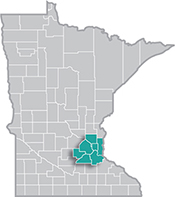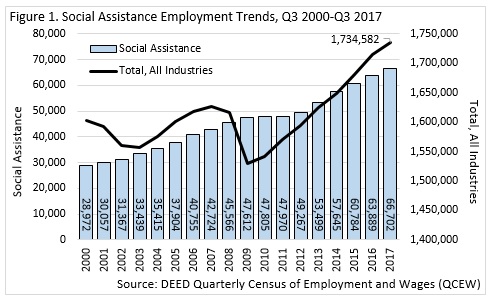 The Minneapolis-St. Paul metropolitan area is a national leader in finance, advanced manufacturing, agriculture and retailing.
The Minneapolis-St. Paul metropolitan area is a national leader in finance, advanced manufacturing, agriculture and retailing.
Medical devices, electronics and processed foods are strong suits recognized globally.
Want the freshest data delivered by email? Subscribe to our regional newsletters.
3/26/2018 10:09:32 AM
Tim O'Neill
To put it simply: Social Assistance is growing quickly in the Twin Cities Metro Area. Between the third quarters of 2000 and 2017, this industry gained over 37,700 jobs, ballooning by an incredible 130 percent. That pace of growth over the past 17 years is over 16 times that of the total economy. During the Great Recession, when the region lost nearly 100,000 jobs, Social Assistance gained about 5,000 jobs, growing by over 11 percent. Since 2000, there has not been one year where Social Assistance has lost jobs.

When compared with all other industry sectors in the region, Social Assistance was the 2nd largest-growing (only behind Professional, Scientific, and Technical Services) and 5th fastest-growing (only behind Warehousing and Storage, Beverage and Tobacco Product Manufacturing, Water Transportation, and Performing Arts and Spectator Sports) between the third quarters of 2012 and 2017. During that same period of time, Social Assistance accounted for about 43 percent of employment growth within the broader industry sector, Health Care and Social Assistance, far outpacing Ambulatory Health Care Services, Hospitals, and Nursing and Residential Care Facilities.
Knowing that Social Assistance has been growing so quickly in the Metro Area, it's good to know what this industry sector includes. According to the North American Industry Classification System (NAICS), Social Assistance is made up of the following subsectors:
Gaining over 11,500 jobs between the third quarters of 2012 and 2017, Services for the Elderly and Persons with Disabilities was the largest-growing subsector within Social Assistance in the past five years. During that same period of time, Child Day Care Services was the second largest-growing subsector within Social Assistance, added over 3,600 jobs.
With 2,691 establishments supplying over 66,700 jobs in the Metro Area, Social Assistance is a very large industry within the region. Coupled with rapid growth, the demand for workers in this industry is high. Top-employing occupations in Social Assistance include Personal Care Aides; Childcare Workers; Preschool Teachers; Home Health Aides; Social and Human Services Assistants; Teacher Assistants; Child, Family, and School Social Workers; Rehabilitation Counselors; Social and Community Service Managers; and Nursing Assistants. To learn more about these occupations, visit DEED's Career and Education Explorer tool.
Contact Tim O'Neill at 651-259-7401.